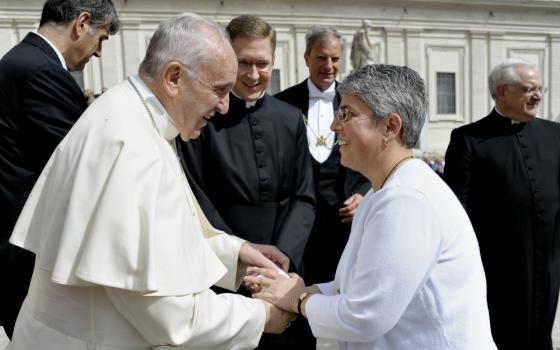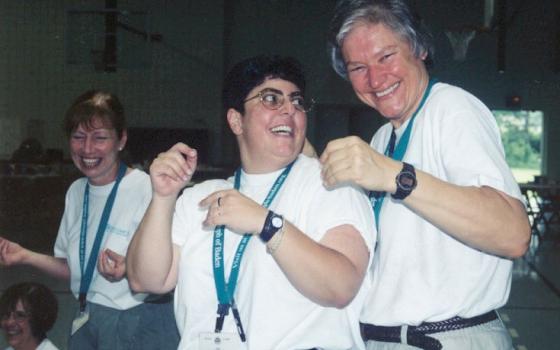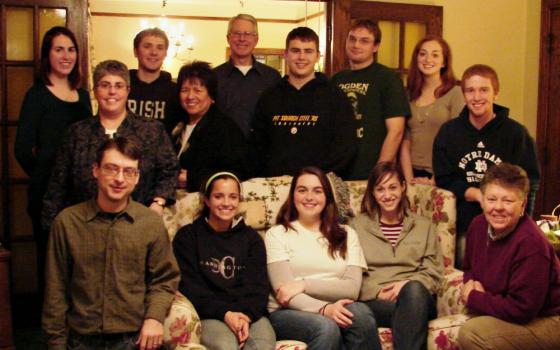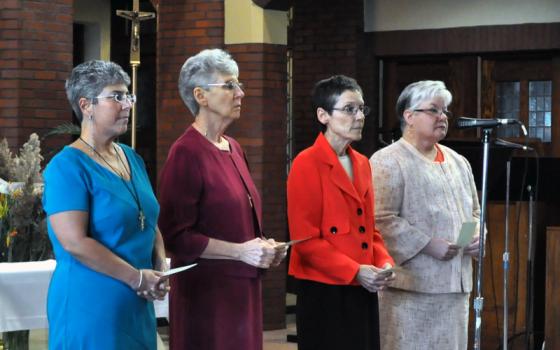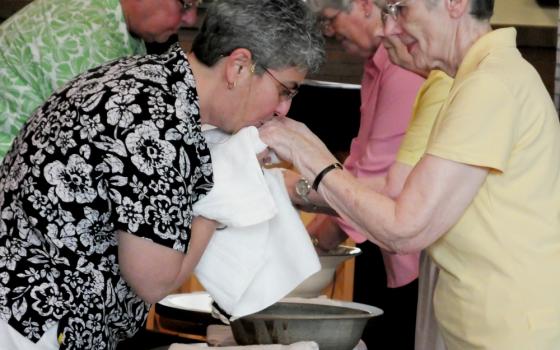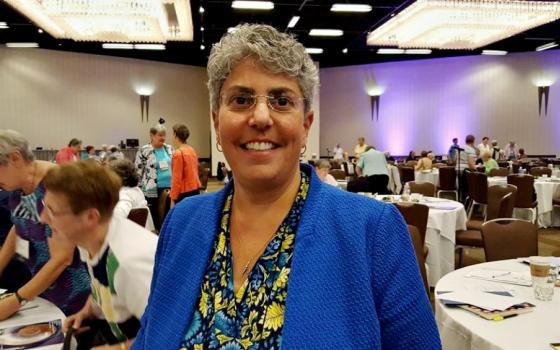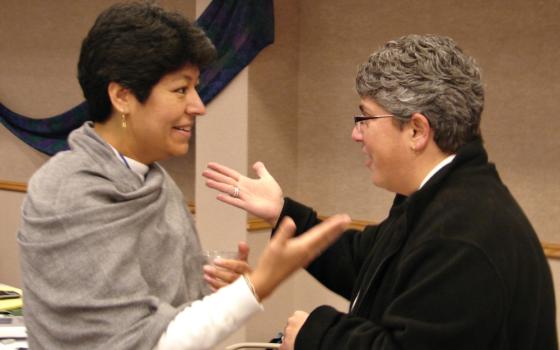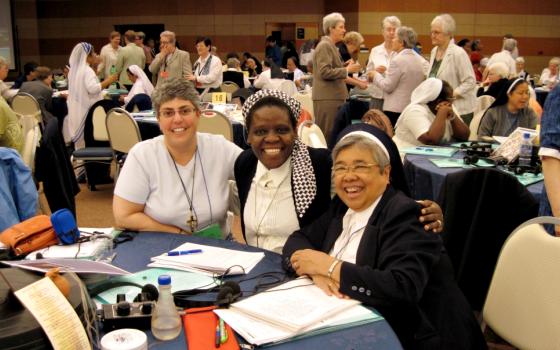A learner, a visionary, a strategic thinker, a source of energy — those close to St. Joseph Sr. Mary Pellegrino have no shortage of buoyant words to say about the outgoing president of the Leadership Conference of Women Religious. Pellegrino will become the past president Aug. 11.
"No matter what she faces, she just has a great ability to trust herself and to trust others around her, so she gains the trust of people in return," said Fr. Joe Mele, who knew Pellegrino as a girl and has worked and collaborated with her through the years.
"That would always be done with a sparkle in her eye and smile on her face."
What began as a recurring curiosity for religious life eventually led to Pellegrino running the conference this past year while navigating the tough questions confronting women religious. However, Pellegrino and her friends say the Sister of St. Joseph is the right leader for the times.
At the upcoming LCWR assembly, set for Aug. 7-11 in Orlando, Florida, Pellegrino will transition from president to past president, passing the baton to the president-elect, Sister of Charity of the Incarnate Word Teresa Maya, while remaining an active partner in the presidential triumvirate.
"To be able to serve in leadership at a time when the life is evolving and there's so much to contribute to the evolution and creativity across congregations and regions — it's exciting," Pellegrino said.
"It's not business as usual."
A perfect fit
Born Sept. 1, 1963, and raised in Pittsburgh, Pellegrino comes from a Catholic family actively engaged in the church after the Second Vatican Council. Because Sisters of St. Joseph staffed her elementary school, Pellegrino was exposed to religious life and the St. Joseph charism early.
Her language arts teacher in junior high, St. Joseph Sr. Mary Susan Connell, said that even as a student, Pellegrino showed she shared their charism of "union." Pellegrino's natural ability to engage others made her a leader at an early age, respected by both peers and adults, Connell added.
While Pellegrino's private interest in the vocation lingered throughout adolescence, the sudden death of her twin friends' father challenged her faith during her senior year of high school.
"I was just devastated by the death, but more devastated by the [question of], 'Who is this God that I believe in?' and I couldn't believe in any longer," she said. "If this is what God does, then I don't want any part of it."
Pellegrino's struggle with faith continued through her first years in college, resulting in minimal church participation while studying journalism at Indiana University of Pennsylvania. But after a few years without God in her life, she learned at the end of her sophomore year that she was just "pretending."
"I really experienced a God in myself and [a] relationship with God that was so much more than Santa Claus," she said. "It was such a bigger experience of God. ... I kind of came back, and what I knew was that God had never really left, that God was part of that struggle with me."
Her curiosity about religious life resumed, though stronger. Pellegrino got involved in the Newman Center for pastoral ministry for college students, took journalism internships, and participated in summer ministry programs run by the Sisters of St. Joseph.
During one summer ministry program, she lived with the Sisters of St. Joseph as the program coordinator and in 1986, requested to enter the novitiate of the Sisters of St. Joseph of Baden, Pennsylvania, thinking she might not last more than a year.
"Here I am, 31 years later," said Pellegrino, who professed her first vows in 1988 and her final vows in 1993.
The Sisters of St. Joseph were a constant throughout Pellegrino's youth, but she made a point to expose herself to other communities throughout her discernment.
But even to those around her, she radiated the charism of St. Joseph: "union," which to her means "to love God and the dear neighbor without distinction," immersing the community in the world until everyone becomes a neighbor.
"I felt it in her more than I intellectually saw it in her," said St. Joseph Sr. Paula Drass, the novice director when Pellegrino entered the community. "She had the spirit of who we are," and even today, "it's just at the surface, available to her always."
As Pellegrino describes it, "Something authentic and deep and real in me was awakened." Though at the time she lacked the language to place it, "I knew I felt at home."
In 1987, the St. Joseph sisters' charism meant being a neighbor to people with AIDS.
By that time, three of Pellegrino's college friends had died of the disease, making it a personal issue. Alongside Jesuit priests, she was the personal care aid at Bailey House in the heart of New York City's Greenwich Village — a seven-week stint that would become her "most profound experience of the presence of God."
"Being immersed in the suffering of Christ," she said, "was the most challenging ministry I've ever done, the most intimate that I've ever been exposed to, and really the most formative for me."
Pellegrino's gift in this ministry was her ability to "bring cohesion to the ministry we were doing and to serve people in a more meaningful way," said Mele, who first met Pellegrino when he was parochial vicar of her home parish and who ministered to AIDS patients with her.
When the son of an Italian woman was dying of AIDS, Mele said, it was Pellegrino who "put the pieces in place" on how to minister to her effectively.
Mele recalled that the woman, who didn't speak English well, was devastated, and "Mary had a way of helping us see that tragedy wasn't the last word, that God and grace has the last word."
"By helping her understand that, we'd be able to have Carmela laugh and be able to look at the time we still had with her son as just time to really live rather than grieve or see the darkness," he said.
Through this experience, Pellegrino learned to see how the paschal mystery is "embedded in all creation," which she said has provided her with the ability to do leadership and ministry with "as broad a context as possible."
"As we are really discerning, and as the life itself is evolving and emerging, there's a dimension of leadership that I believe is very much about communal discernment and communal formation," she said — particularly now, as the conference has made a conscious effort to lean into and deepen contemplative practices.
A call to leadership
Mele said that, as a girl in school, Pellegrino was bright, popular, possessed a beautiful sense of humor, and was comfortable with people of all ages, including the priests and sisters at her parish, St. Catherine of Siena in Beechview, Pennsylvania.
"Even as a young woman at that time, [the pastor and I] could see not only the call to religious life, but also to leadership," he said.
Drass said she too had an early hunch, even when Pellegrino was a novice, that she would end up in formation or leadership in the congregation.
"And she has done both," Drass said: Pellegrino eventually became a formation director and twice served as congregational moderator (akin to president).
Despite having a well of leadership experience from which to draw, Pellegrino said nothing could prepare her for leadership in religious community, "especially in evolving life." Her training in journalism has been instrumental in communicating effectively, she said, honing what she considers the "lost art" of writing.
In 1994, she received a master's degree in religious education from Fordham University and in 2007, a master's degree in Christian spirituality from Creighton University.
Throughout the 1990s, she also served as campus minister at St. Thomas More University Parish in Indiana, Pennsylvania, where she provided pastoral care and faith formation for students and parishioners. The experience in vocation and formation ministries has informed her leadership, she said, especially now.
Pellegrino was invited to consider the nomination for president of LCWR a number of times, but said she always felt she lacked enough experience. After being nominated in 2015, however, she worked with her spiritual director and discerned that her duty was to say whether she could be available, while the conference's was to discern whether she should be elected.
On Aug. 14, 2015, the conference chose her as president-elect.
Courageous conversations
Like the congregations under its canopy, LCWR's challenges include taking a close look at its organization and governance and "reconfiguring ourselves to the future," Pellegrino said. As its member-congregations evolve, so should LCWR — a challenge for its leadership, she added, in the midst of already-challenging times.
"At every turn, the values of the Gospel are challenged and really obscured in some places. Being in consecrated life in the climate and culture we have now, it is inviting enormous amount of reflection and self-searching and asking, 'What is ours to do here? Does it change the nature of what consecrated life is in that climate?' "
Being president of a U.S. conference has also reminded Pellegrino of religious life outside the United States. Her exposure to the global church heightened her appreciation for its efficacy and the range of experiences universal religious life encompasses, a highlight of her presidency for which she is grateful.
Pellegrino said the annual LCWR leadership trips to Vatican dicasteries "situated the church in the U.S. very differently for me." However, she added, this doesn't diminish the experience of the American church.
"In areas of conflict, violence and great poverty, there are many church dicasteries and international organizations that have great regard for the presence of religious," she said. "To understand and to realize the credibility that consecrated men and women have in those places — it was really just an amazing kind of affirmation of what it means to be in the presence of the Gospel."
Pellegrino cited some of the organization's accomplishments in the last year.
Since Pellegrino was elected, LCWR provided guidance to the committee that eventually obtained a grant for Hispanic sisters in the United States, creating the Association of Latin American Missionary Sisters (AHLMA, the Asociación de Hermanas Latinas Misioneras en América, formerly known as ARHEU). LCWR's three presidents — Pellegrino, Maya and past president St. Joseph Sr. Marcia Allen — and its executive director, Holy Cross Sr. Joan Marie Steadman, went to Rome for an international meeting on a study of international sisters.
Advocacy work in immigration reform, health care legislation, climate change, peace-building and human trafficking also shaped the year, with LCWR collaborating with a number of organizations on a variety of social justice issues.
LCWR's partnerships coupled with its organizational changes — which reflect the evolving demographic and geographic realities — are just some of the several defining details of the year, Pellegrino said.
As for standout moments in leadership, Pellegrino recalled last year's assembly. The conference invited Shannen Dee Williams to present her research on the experience of black women in (and their rejection from) religious life. As a congregational leader, Pellegrino said absorbing those facts — of women being denied their vocation because of their race in the 1960s — felt personal.
"It pierced the narrative, which is also true, that our sisters were very actively engaged in the civil rights agenda. ... I was so proud and so grateful that, at the conference level, we were able to raise that up, provide that exposure, and really acknowledge ourselves, acknowledge the fullness of a truth that this has happened and might still be happening," she said.
"I want to be clear that it doesn't erase or negate all the good around all the engagement in civil rights and race relations that sisters are doing, but we realized that we could not speak with any credibility or advocate for an eradication of racism outside ourselves knowing that we, too, were perpetrators."
That readiness to discuss race and religious life meshes with Drass' description of Pellegrino's strengths: She's willing to engage in courageous conversations, to say things out loud and to ask the hard questions.
"When she speaks, she makes me sit up and take notice," Drass said.
'Consecrated life is really God's business'
While the most prevalent topic regarding the future of religious life tends to focus on dwindling numbers, Pellegrino said she "never did worry about the numbers game." Since she entered religious life in the 1980s, she said, it's been the same "alarmist narrative" that conflates the success of religious life with numbers.
Pellegrino said she finds this outlook shortsighted and relative, as it originates with the anomaly of the post-World War II boom, when a variety of sociological and economic factors contributed to religious life's peak number of new members.
Pellegrino's optimism during what others might consider a crisis is a testament to her ability to "look beyond," Connell said.
"She's a person that has the total picture of something that's going on, has a bigger-than-herself view of life," Connell said, adding that Pellegrino has ability to bring others along on what may seem like unconventional or challenging paths.
Indeed, Pellegrino is flipping the perspective surrounding diminishment in religious life: Economic challenges should not be equated with vocational challenges, she said.
"I believe consecrated life is really God's business, and I think my part is showing up and paying attention," she said. "I believe God will call men and women into this life in ways that are familiar to us and likely in ways that are going to be new to us."
[Soli Salgado is a staff writer for Global Sisters Report. Her email address is ssalgado@ncronline.org. Follow her on Twitter: @soli_salgado.]
